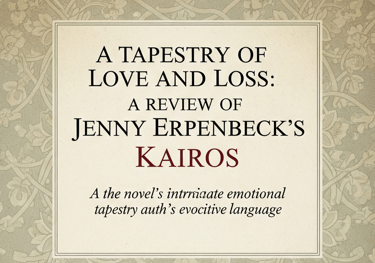Kairos Review: Jenny Erpenbeck's 2024 Booker Prize Winner
BOOKS REVIEW
Chaifry
5/31/20253 min read
Kairos by Jenny Erpenbeck: International Booker Prize for Kairos
Jenny Erpenbeck, a celebrated German novelist and opera director, won the 2024 International Booker Prize for Kairos (2021), translated into English by Michael Hofmann. Set against the waning years of the German Democratic Republic (GDR), this novel intertwines a tempestuous love affair with the seismic political shifts of 1980s East Berlin. Its title, invoking the Greek god of opportune moments, captures the fleeting intersection of personal passion and historical upheaval.


Erpenbeck’s lyrical prose and innovative narrative structure make Kairos a profound exploration of love, power, and loss. This review argues that Kairos is essential reading for its masterful weaving of intimate and political narratives, offering a universal reflection on how history shapes human connections and identities.
Kairos traces the volatile relationship between Katharina, a 19-year-old student, and Hans, a married writer in his fifties, beginning with a chance encounter on a bus in East Berlin in 1986: “They meet by chance on a bus. She is a young student, he is older and married” (Erpenbeck, 2021, p. 3). Their affair, initially fueled by shared passions for art and music, unfolds with intensity: “Love, love, love, he says to himself, all at once the word seems quite empty” (Erpenbeck, 2021, p. 127). As their relationship deepens, Hans’s controlling nature emerges, turning passion into cruelty after Katharina’s brief infidelity: “Discipline must be at least as powerful as the desire to lose it” (Erpenbeck, 2021, p. 89).
The novel parallels their deteriorating bond with the GDR’s collapse, as Hans, a former fascist turned communist, grapples with a fading ideology. Katharina’s youth and dreams of theater clash with his rigid worldview: “Was he just looking for a more attractive mirror for himself in her young flesh?” (Erpenbeck, 2021, p. 127). The narrative, framed by Katharina’s reflections on Hans’s death years later, uses diaries and letters to revisit their affair, set against the fall of the Berlin Wall: “The fall of the Wall is an idea of breaking free” (Erpenbeck, 2021, p. 245). The story concludes with the unraveling of both their love and the socialist ideals that once defined their world.
Kairos is a literary triumph, blending personal and political narratives with exquisite prose. Erpenbeck’s present-tense, stream-of-consciousness style, deftly translated by Hofmann, creates a claustrophobic intensity, with thoughts of Katharina and Hans often merging without clear delineation: “The reader has to bring their punctuation” (Erpenbeck, as cited in The Guardian, 2024). This technique mirrors the chaotic overlap of personal and societal collapse, making the novel a compelling allegory for the GDR’s dissolution. The novel’s strength lies in its refusal to reduce the affair to mere symbolism; as critic Robert Rubsam notes, Erpenbeck “doesn’t reduce their romance to mere allegory” (The Washington Post, 2024). Instead, it captures the raw complexity of love under duress, with Hans’s manipulative behavior reflecting the GDR’s bureaucratic control.
The novel’s cultural specificity, rooted in Erpenbeck’s East German background, adds depth, drawing parallels with works like Christa Wolf’s The Quest for Christa T.. However, its middle section can feel repetitive, with prolonged focus on the lovers’ arguments, which may test readers’ patience. Additionally, the sparse use of dialogue markers, while immersive, can disorient, requiring active reader engagement. Despite these challenges, the novel’s emotional resonance and historical insight make it a standout, with its ending leaving a lasting impact.
Kairos is a masterful exploration of love’s fragility and the weight of history, blending lyrical prose with incisive political commentary. Erpenbeck’s innovative narrative and Hofmann’s eloquent translation create a work that is both intimate and expansive, capturing the personal toll of a nation’s collapse. Minor issues, such as occasional repetitiveness and stylistic density, do not overshadow its brilliance. This novel is highly recommended for readers who appreciate literature that intertwines personal and historical narratives, offering a poignant reflection on freedom and loss. Erpenbeck’s International Booker win affirms Kairos as a vital contribution to global literature.
References: Erpenbeck, J. (2021). Kairos (M. Hofmann, Trans.). Granta Books.
